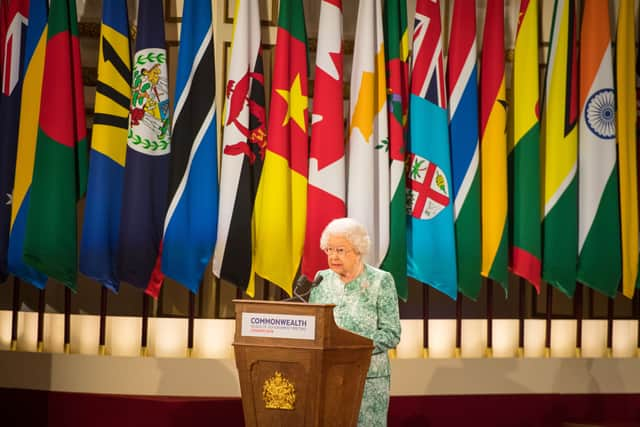Which countries are in the Commonwealth? Political association and British Empire link explained
and live on Freeview channel 276
Following the death of Queen Elizabeth II, many countries will be welcoming the newly appointed King Charles III as their head of states.
The group of countries is known as the Commonwealth, and are linked in history with Great Britian and the Royal Family.
Advertisement
Hide AdAdvertisement
Hide AdBut what is the origins of the Commonwealth, and which countries are a member of the group?
Here’s everything you need to know.


What is the Commonwealth?
The Commonwealth, known officially as the Commonwealth of Nations, is a voluntary political association in which almost all of its members are former territories of the British Empire.
It was first referred to as the ‘Commonwealth of Nations’ in 1884 by Lord Roseberry, who used the term during a speech in Adalaide, Australia.
The British Empire once covered one fifth of the world’s surface, therefore after the dissolution of the Empire, the Commonwealth was a way for Britain to keep a sphere of influence over its former territories.
Advertisement
Hide AdAdvertisement
Hide AdAccording to The Commonwealth, the aim of the group is to support member states in “shared goals” such as “development, democracy and peace”.
Which countries are a member of the Commonwealth?
The Commonwealth currently has 54 independent countries as members.
Around 2.5billion people live within the Commonwealth area, which spans Africa, Asia, Europe, the America and the Pacific.
The current member of the group are:
Africa
- Botswana
- Cameroon
- Gambia
- Ghana
- Kenya
- Eswatini
- Lesotho
- Malawi
- Mauritius
- Mozambique
- Namibia
- Nigeria
- Rwanda
- Seychelles
- Sierra Leone
- South Africa
- Uganda
- Tanzania
- Zambia
Asia
- Bangladesh
- Brunei
- India
- Malaysia
- Maldives
- Pakistan
- Singapore
- Sri Lanka
Caribbean and Americas
- Antigua and Barbuda
- The Bahamas
- Barbados
- Belize
- Canada
- Dominica
- Grenada
- Guyana
- Jamaica
- St Lucia
- St Kitts and Nevis
- St Vincent and the Grenadines
- Trinidad and Tobago
Europe
- Cyprus
- Malta
- United Kingdom
Pacific
- Australia
- Fiji
- Kiribati
- Nauru
- New Zealand
- Papua New Guinea
- Samoa
- Solomon Islands
- Tonga
- Tuvalu
- Vanuatu
The group has a voluntary membership process, with countries who were not members of the British Empire also welcome to join.
Have any countries ever left the Commonwealth?
Advertisement
Hide AdAdvertisement
Hide AdMemebr countries can choose to terminate their membership in line with the voluntary membership process.
Although not common, some countries have left the group, with others suspended.
Nigeria was suspended from November 1995 until May 1999 for the execution of Ken Saro-Wiwa on the eve of the annual Commonwealth Heads of Governments Meeting in 1995.
Pakistan served the group’s longest suspension, being expelled from October 1998 until May 2004 as a result of a military coup orchestrated by Pervez Musharraf.
Advertisement
Hide AdAdvertisement
Hide AdOther countries to be suspended include Fiji and Zimbabwe, with the latter choosing to remove itself from the organisation after its suspension came to an end.
Ireland chose to leave the in the 1930s, however its status as a republic was disputed by the Commonwealth, which continued to recognise the country as a member until 1949.
The organisation removed South Africa in 1961, with countries in Africa, Asia and the America pointing toward racial apartheid as a pressure point. The country was then re-introduced in 1994, after the country’s first multiracial elections.
In 1997, Hong Kong ceased memberhsip of the group after the transfer of sovereignty in the region. Membership rules state that non-sovereign states or regions cannot be members of the Commonwealth.
Who is the Head of the Commonwealth?
The current Head of the Commonwealth is King Charles III.
Advertisement
Hide AdAdvertisement
Hide AdAlthough it is commonly believed that the next in line to the throne would automatically become the next head, this is not in fact true.
When the sitting monarch dies, the title is not automatically handed down.
However, it had been already agreed that the then-Prince Charles would take on the role following the death of the Queen.
Comment Guidelines
National World encourages reader discussion on our stories. User feedback, insights and back-and-forth exchanges add a rich layer of context to reporting. Please review our Community Guidelines before commenting.
